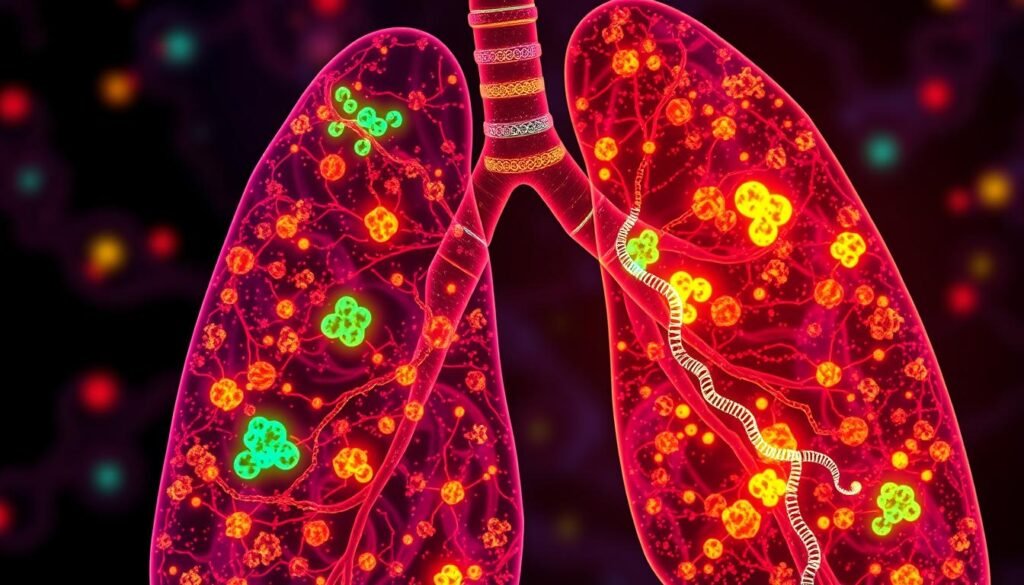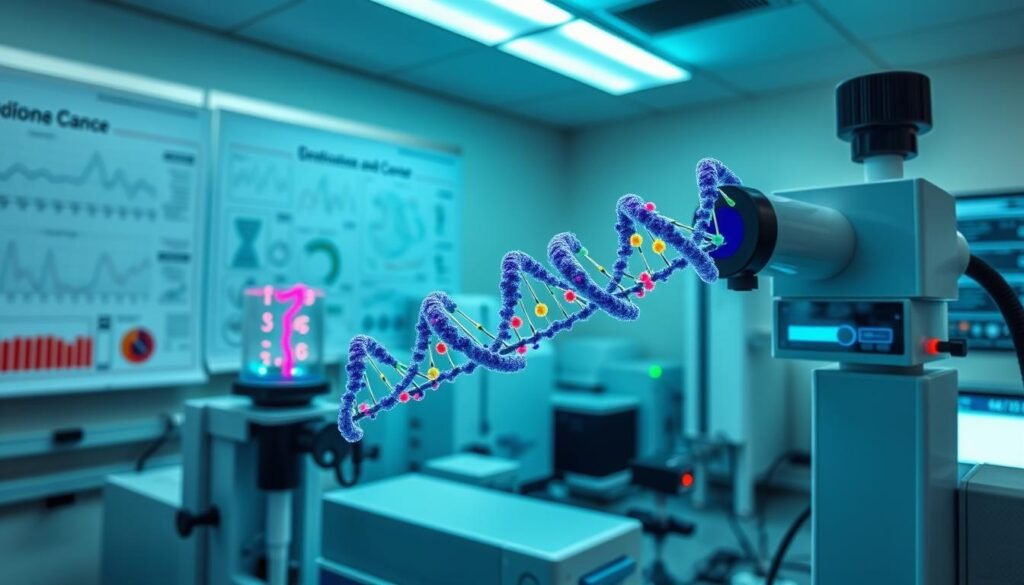Lung cancer is the top cancer worldwide, with about 1.8 million new cases and 1.6 million deaths in 2012. Non-Small Cell Lung Cancer (NSCLC) makes up 85% of these, showing important findings in gene mutations. Mutations in genes like TP53 and KRAS are key in its progress and treatment. Between 40% to 51% of NSCLC cases have TP53 mutations, and KRAS mutations occur in around 30% of cases, mainly in smokers.
Knowing the mutated genes in lung cancer is crucial for both diagnosis and choosing the best treatment. This guide will explore how genetic testing and treatments are evolving, offering new hope. Identifying these driver mutations is critical for personalized therapies, advancing cancer control.
Key Takeaways
- Over 85% of lung cancer cases are NSCLC.
- TP53 mutations are linked to 40% to 51% of all NSCLC cases.
- KRAS mutations occur in approximately 30% of NSCLC cases, predominantly among smokers.
- Genetic tests for NSCLC typically yield results within 1 to 2 weeks.
- Targeted therapies like Sotorasib (Lumakras) focus on specific gene mutations.
- New research highlights the role of additional mutations such as BRAF and MET in lung cancer.
Introduction to Gene Mutations in Lung Cancer
Gene mutations are key in lung cancer’s development, they affect how the disease progresses. Mutated genes in lung cancer change protein levels. This leads to uncontrolled cell growth and cancer. Knowing about these mutations helps in treating lung cancer, linking specific ones to treatment responses.
Certain mutations like EGFR, KRAS, and TP53 are crucial in non-small cell lung cancer. For example, up to 23% of these cancers have the EGFR mutation. TP53 mutations impact 50%. KRAS mutations are found in about 30% of cases. These figures show why genetic testing is vital. It helps doctors customize treatments. More on personalized treatment and gene testing is here.
Some lesser-known mutations also play big roles, like MET and ALK, each found in about 5% of cases. ROS1 mutations appear in 1-2% of people with this cancer, and BRAF mutations in 3-4%. KRAS and BRAF are more common in smokers. ROS1 and ALK are often in younger, non-smokers. This shows how genes and environment work together in lung cancer.
Understanding lung cancer gene mutations is key to better patient care. As we learn more, we can make therapies aimed at these mutations. This means more hope for those facing lung cancer.
Understanding Lung Cancer and Its Types
Lung cancer leads in cancer deaths worldwide. It’s mainly of two types: non-small cell lung cancer (NSCLC) and small cell lung cancer (SCLC). Knowing the difference helps doctors treat it better and predict outcomes.
Overview of Non-Small Cell Lung Cancer (NSCLC)
About 85 percent of lung cancer cases are NSCLC. This group is split into three subtypes:
- Lung adenocarcinoma: makes up about 40% of NSCLC cases. It’s common in non-smokers and women.
- Squamous cell lung cancer: makes up roughly 30% of NSCLC and is often seen in smokers.
- Large cell lung cancer: this is the least common, making up the rest of the cases.
Common gene changes in NSCLC patients, like TP53, EGFR, and KRAS, play a big role in treatment and outcomes. Survival rates depend on the type and stage, generally between 11 to 17 percent after five years.
Small Cell Lung Cancer (SCLC) Basics
Small cell lung cancer is about 15 percent of cases. It’s very aggressive. More than half the time, it’s found after spreading beyond the lungs. This affects survival rates and treatments.
It has unique gene changes leading to different treatment challenges. Learning about these helps in improving care for patients.
What Genes Are Mutated in Lung Cancer
Lung cancer involves a range of genetic changes that affect diagnosis and treatment. Knowing these mutated genes helps us better understand the disease. It also lets us tailor treatments to each person, improving their chances of recovery.
Key Genes Affected in Lung Cancer
Some genes are more likely to mutate in lung cancer patients. This table shows the main gene mutations and what they mean:
| Gene Mutation | Percentage of Cases | Characteristics |
|---|---|---|
| TP53 | ~50% | Predominantly found in non-small cell lung cancer patients. |
| KRAS | ~25% | More common in smokers and adenocarcinoma patients. |
| EGFR | ~30% | Prevalent in non-smokers, women, and adenocarcinoma patients. |
| ALK | 3% to 7% | Affects primarily non-smokers and younger men. |
| MET | Up to 5% | Associated with aggressive cancer forms. |
| BRAF | Up to 3% | Common among women, smokers, and adenocarcinoma patients. |
Importance of Genetic Testing in Lung Cancer Patients
Genetic testing is key for personalizing lung cancer treatment. By finding out which mutations are present, we can choose better therapies. For example, testing for mutations like EGFR, ALK, and ROS1 helps us use targeted treatments. These can be very effective for advanced non-small cell lung cancer.
We’re also looking more at germline mutations, which we used to think weren’t very important. Now, we see they could help us choose the right treatment paths. This shows why it’s important to test all lung cancer patients for genetic changes.
The Role of Somatic and Germline Mutations
Understanding somatic and germline mutations is key in lung cancer research. Somatic mutations in lung cancer usually come from the environment. Germline mutations are often passed down in families. These differences greatly affect how the disease develops and the patient’s outcomes.
Differences between Somatic and Germline Mutations
Somatic mutations happen during a person’s life. They can be caused by things like tobacco or chemicals. On the other hand, germline mutations are in our DNA from birth and can be inherited. While most lung cancers happen by chance, a few are linked to these inherited mutations. This is especially true for those with family histories of the disease.
Impact of Lifestyle on Somatic Mutations
Lifestyle choices greatly affect somatic mutations in lung cancer. Smoking, for example, is a known risk that leads to genetic changes linked to lung cancer. People who have had lung cancer before are more likely to get these mutations. Also, having germline mutations in certain genes, like EGFR, can increase lung cancer risk. This is true even if the person has never smoked.
Common Oncogenes Involved in Lung Cancer
Oncogenes are key in lung cancer development, especially in non-small cell lung cancer (NSCLC). These gene mutations trigger unchecked cell growth, leading to cancer. Knowing about mutations in EGFR, KRAS, ALK, and ROS1 offers clues for treatment and prognosis.
Epidermal Growth Factor Receptor (EGFR)
About 10-15% of lung cancers have EGFR mutations, mainly in non-smokers. Treatments targeting EGFR, like tyrosine kinase inhibitors, have improved patient care. Drugs such as gefitinib and erlotinib work well for these patients. This shows why genetic tests are crucial to find the right treatment.
KRAS Mutations and Their Implications
KRAS mutations appear in up to 30% of NSCLC cases, making it a common oncogene. About 13% of NSCLC patients have the KRAS G12C mutation. The Codebreak100 trial saw a 32.2% response rate to sotorasib. The KRYSTAL-1 trial showed a 45% response rate to adagrasib, highlighting the promise of targeting KRAS mutations.
Role of ALK and ROS1 Mutations
ALK mutations are found in about 5% of NSCLC, often in younger people. ALK inhibitors like crizotinib are effective for ALK-positive cases. ROS1 fusion mutations occur in 1-2% of lung adenocarcinomas. They don’t overlap with other mutations. Crizotinib is 60% effective against ROS1-positive lung cancer. These targeted treatments are changing the game for patients with different oncogene mutations.
For more details on gene mutations in lung cancer, check out this informative article.
Tumor Suppressor Genes in Lung Cancer
Tumor suppressor genes are key in controlling cell growth and keeping our DNA stable. The TP53 gene is especially important for lung cancer. It helps stop the spread of cells that could turn cancerous. Because of this, lung cancer is hard to treat when TP53 genes change.
The Function and Significance of TP53
TP53 is like the body’s DNA watchdog. It makes a protein that stops damaged cells from dividing. Many lung cancers have changes in the TP53 gene. In small cell lung cancer (SCLC), up to 86% of patients show these mutations. This shows how critical TP53 is in fighting lung cancer.
Impact of Tumor Suppressor Gene Mutations on Treatment
Mutations in suppressor genes make treating lung cancer tough. TP53 changes can make some treatments less effective. Scientists are looking for ways to improve treatments for these patients. Knowing how suppressor genes work helps in finding better treatments.

Emerging Gene Mutations in Lung Cancer
Lung cancer is changing as research finds new mutations. These changes may greatly affect a patient’s outlook and treatment choices. BRAF and MET mutations, especially, are becoming key in lung cancer treatment.
BRAF and Its Connection to Lung Cancer
About 3-4% of lung cancer cases have BRAF mutations. This is common among those who smoke. These mutations respond differently to targeted treatments. With more knowledge on BRAF, we might find better, personalized treatments.
MET and Its Role in Aggressive Lung Cancer
MET mutations occur in roughly 5% of lung cancer patients. They’re linked to tougher cancer types, affecting treatment and survival. Studying MET helps reveal why some treatments don’t work, showing the need for more research.
| Mutation Type | Prevalence | Associated Factors | Clinical Implications |
|---|---|---|---|
| BRAF | 3-4% | Common in smokers | Potential for targeted therapy |
| MET | 5% | Aggressive cancer phenotype | Impact on treatment resistance |
Testing for Gene Mutations in Lung Cancer
Genetic testing is key in lung cancer care. It finds specific mutations that change treatment choices. Many methods are there, each with its own advantages. This part talks about genetic testing methods. It also covers the benefits of biomarker testing for treating patients.
Methods of Genetic Testing
Various methods help find lung cancer mutations. These include:
- Molecular Analysis: This looks at tumor DNA to find genetic changes.
- Next-Generation Sequencing (NGS): It analyzes many genes at once. This gives details on different mutations that could affect treatment.
- Biomarker Testing: It identifies specific genetic changes linked to lung cancer. This helps tailor treatments to each patient.
The main goal of genetic testing in lung cancer is to find mutations for targeted therapies. The best results come from using tumor tissue samples. But, liquid biopsies can also work when tissue samples aren’t available.
Benefits of Biomarker Testing for Patient Treatment
Biomarker testing in lung cancer has many benefits. It helps customize treatment. By understanding gene mutations, healthcare providers can:
- Choose targeted therapies that are more likely to work based on the mutations.
- Know which treatments might not work due to specific gene changes in the cancer cells.
- Make better decisions quickly. Genetic test results usually take a few days to over a week.
Genetic testing is vital because it provides a disease’s genomic profile. This leads to more accurate and effective treatment plans. These are made just for a patient’s unique lung cancer traits.

Targeted Therapies for Lung Cancer Gene Mutations
Targeted treatments for lung cancer focus on certain gene changes. This is a key step forward in how we treat the disease. With precision medicine lung cancer, doctors make treatments that fit each patient’s genes. This makes therapies more effective and can greatly improve patient results.
Overview of Targeted Therapy Approaches
In targeted therapies lung cancer, some drugs are very important. Monoclonal antibodies and tyrosine kinase inhibitors are two main kinds. They go after the genes that make the cancer grow. Drugs that target EGFR, ALK, and KRAS are good examples. They focus on the genetic issues that help the cancer spread.
Current FDA-Approved Drugs for Specific Mutations
The choices for FDA-approved drugs lung cancer keep getting better as we learn more. Right now, drugs like erlotinib and crizotinib are available for NSCLC. They work well against certain genetic changes. The arrival of sotorasib was a big moment for those with KRAS mutations. It works really well, according to studies. Also, trying out combinations of these drugs could mean even better treatments. As we understand lung cancer’s genetics more, we expect to find new ways to help those affected by this tough disease.
| Drug | Targeted Mutation | Type | Notes |
|---|---|---|---|
| Erlotinib | EGFR | TKI | Improves overall survival in EGFR mutation-positive patients. |
| Crizotinib | ALK | TKI | Effective in alk-positive NSCLC cases. |
| Sotorasib | KRAS | TKI | Demonstrated significant tumor shrinkage for KRAS mutations. |
| Bevacizumab | VEGF | Monoclonal Antibody | Used in combination with chemotherapy. |
Research Advances and Clinical Trials
Ongoing lung cancer research has led to big changes in understanding and treating this disease. Studies called clinical trials are key. They help create new treatments that match the tumor’s genes. These trials give patients hope by testing new ways to get better results.
Importance of Clinical Trials in Developing New Treatments
Clinical trials are essential for testing new treatments. They help the medical field move forward. Researchers can see how well new therapies work for certain lung cancer genomics. By using machine learning, they are making strides. These algorithms, which are correct 97% of the time, can spot different types of lung cancer and their genetic changes. This allows doctors to choose the best treatments quickly.
Latest Research Findings in Lung Cancer Genomics
There have been major improvements in treating lung cancer recently. New immunotherapies, like Atezolizumab and pembrolizumab, are now used after surgery for some lung cancers. These drugs, along with targeted therapies like ALK inhibitors lorlatinib and alectinib, work well for certain advanced cancers. Other treatments target specific gene changes in cancer cells, showing how custom cancer treatments can be.
| Treatment Type | Specific Drugs | Targeted Genetic Mutations | Approval Status |
|---|---|---|---|
| Immunotherapy | Atezolizumab, Pembrolizumab, Nivolumab | N/A | FDA Approved |
| ALK Inhibitors | Lorlatinib, Alectinib | ALK | FDA Approved |
| EGFR Inhibitors | Osimertinib | EGFR | FDA Approved |
| BRAF Inhibitors | Dabrafenib, Trametinib | BRAF | FDA Approved |
| Kras Inhibitors | Sotorasib, Adagrasib | KRAS | FDA Approved |

Conclusion
Understanding gene mutations is key in fighting lung cancer effectively. This knowledge helps create custom treatments. It makes sure patients get the most benefit from their therapy.
Genetic testing helps pinpoint the best treatments. This leads to better survival rates. As new treatments become available, genetic testing becomes even more crucial.
Targeted therapies, like those for EGFR and KRAS mutations, are changing lung cancer care. They show how precision medicine can lead to better outcomes. Ongoing research and clinical trials are vital for this progress.
Clinical trials offer new insights into lung cancer treatments. They help find better ways to battle this disease. These studies are the backbone of medical advancement in lung cancer care.
People with lung cancer need to know their treatment options. Learning about targeted therapies is important. As research grows, healthcare providers can give better care.
To get the latest on lung cancer treatments, check out this resource. It offers updates on new therapies and research.